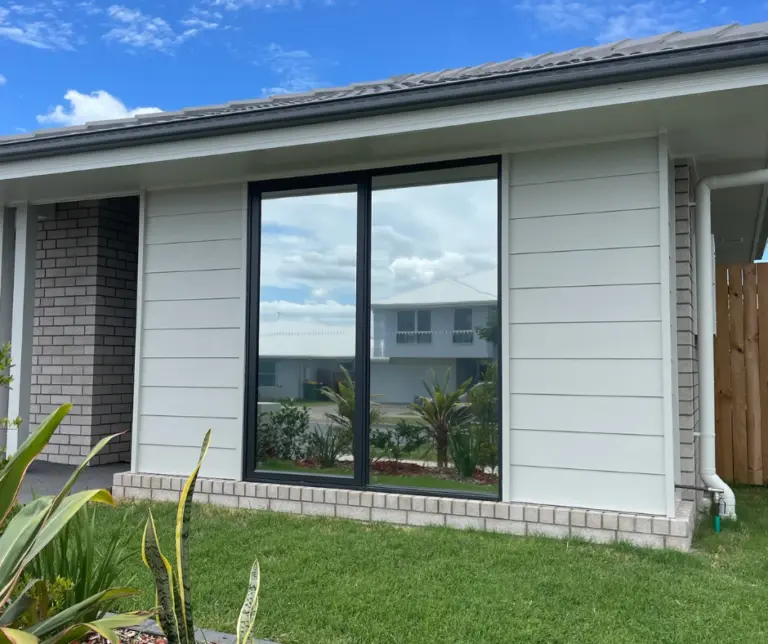Window Tinting FAQ's
FAQ's
Commercial window films need to be more heavy-duty, durable, and effective at blocking heat/UV due to increased sun exposure. Specialty films for amplified privacy, security, or design aesthetics are also more common in commercial settings.
Yes, high-quality commercial window tinting can lower AC bills by up to 30%. By blocking heat and glare, window films reduce the need for cooling.
Absolutely – the increase in comfort, privacy, and security as well as energy savings make professional window tinting very worthwhile for businesses. With proper care, films can also last 10-15 years.
Yes, we offer high-performance reflective clear films that still filter out heat and UV rays without affecting aesthetics.
We provide lifetime warranty on both residential and commercial window films and installation. We stand behind our expert workmanship.
Yes, office window tinting is adaptable for various office types, including high-rise buildings, corporate offices, and small business spaces.
The duration varies based on the size of the project, but typically, office window tinting can be completed within a day for most office spaces.
Modern window tinting technologies allow for maintaining natural light while reducing glare and UV exposure, creating a more comfortable work environment.
Yes, window tinting blocks up to 99% of harmful UV rays, protecting office furniture, carpets, and equipment from fading and sun damage.
Yes, there are various types of window tints available, including solar control films, decorative films, and security films, each offering specific benefits for office environments
Home window tinting offers benefits such as reduced energy costs, UV protection, enhanced privacy, and improved comfort by reducing glare and heat. Read more
Modern window tints allow for maintaining natural light while reducing glare and UV exposure, creating a more comfortable living environment.
Yes, window tinting can enhance privacy during the day by reducing visibility from outside while maintaining clear views from inside.
Window tinting requires minimal maintenance; regular cleaning with non-abrasive materials keeps it looking great.
Quality window tints can last 15 years or more, depending on the type of film and environmental factors. Learn more
Bubbles in newly installed window film often result from trapped air, surface contaminants, or excess moisture. If not properly smoothed, air pockets can form, and dust or dirt on the glass can cause bubbles. The soapy water solution used during installation might not fully evaporate, leading to temporary bubbles. If they persist after a few weeks, reinstallation may be necessary.
For the best results, professional installation is strongly advised. Improperly applied DIY film is prone to bubbling, peeling, and other issues that shorten its lifespan. Our seasoned installers use specialized tools and techniques to ensure flawless, long-lasting adherence.
Yes, UV-blocking window films protect carpets, drapes, and furniture from sun-induced color loss.
To remove window tint from home windows, start by heating the tint with a steamer or hair dryer to soften the adhesive. Gently peel the tint away from a corner, pulling slowly to avoid tearing. Once the film is removed, clean any remaining adhesive using a solution of soapy water or water mixed with ammonia. Finally, wipe down the window with a clean cloth for a streak-free finish.
When choosing how dark to tint your home windows, consider your needs. For privacy, opt for a 20% tint or lower; for heat reduction with natural light, a 30%-40% tint works well. Lighter tint (50%-70%) enhances aesthetics, but always checks local regulations to ensure compliance.
Yes, people can see through tinted home windows at night if the interior lights are on. Window tinting reduces visibility from the outside during the day by reflecting light, but at night, when it’s dark outside and brighter inside, the tint’s effectiveness is reduced, allowing people to see in. For better privacy at night, consider using blinds or curtains in addition to the tint.
Yes, solar window film is beneficial for homes. It helps reduce heat and glare, which can improve comfort and lower cooling costs. Additionally, it blocks harmful UV rays, protecting furniture and flooring from fading. Solar window film also enhances privacy and can add a sleek, modern look to your windows. Overall, it’s an effective way to improve energy efficiency and comfort in your home.
Home window tinting can be beneficial during the winter season. It helps reduce heat loss by providing an extra layer of insulation, which can improve energy efficiency and reduce heating costs. While it’s often associated with cooling and sun control, window tinting can also help maintain indoor temperatures and prevent drafts during colder months.
For home tinting, solar film reduces heat and glare while improving energy efficiency, while Low-E film enhances insulation by reflecting heat. Frosted film offers privacy and a sleek look, and reflective film provides high heat rejection but may appear mirrored. Choose based on your needs for comfort, privacy, and style.
For street front windows, reflective window film is ideal, offering daytime privacy, heat reduction, and UV protection. It maintains a modern look with a mirrored finish. This option is both practical and aesthetically pleasing.
Get A Quote On Your Residential Tint Job Today
The Leading Choice for Commercial and Residential Window Tinting in Brisbane
For unparalleled expertise enhancing commercial spaces across Brisbane, turn to HD Window Tint. Call or submit our form today to request a quote!

